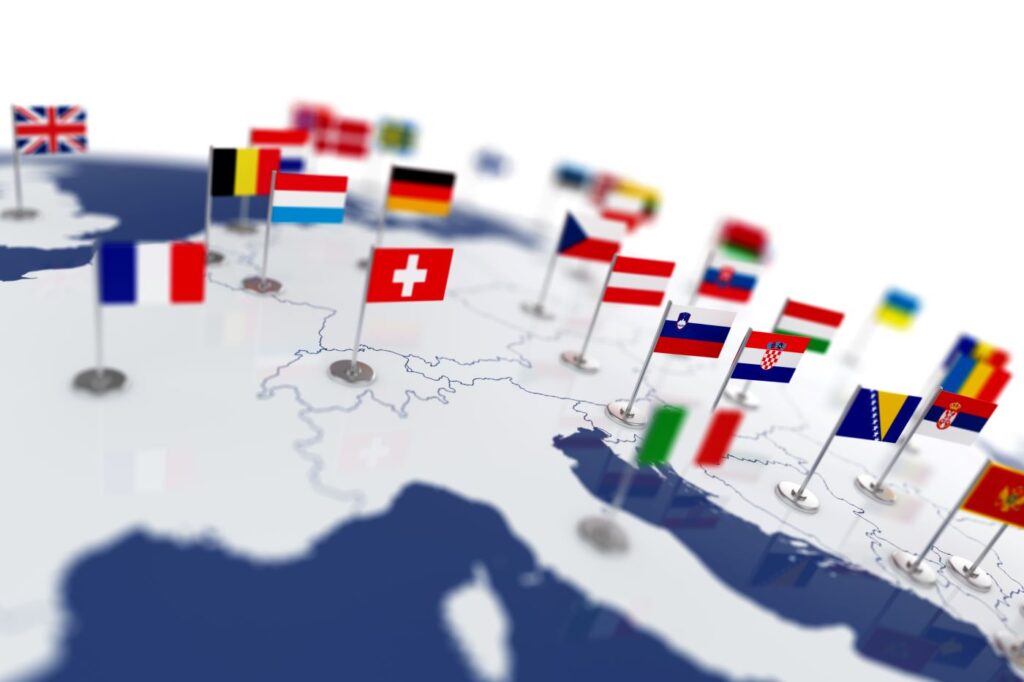This essay is part of Public Discourse’s Who’s Who series, which introduces and critically engages with important thinkers who are often referenced in political and cultural debates, but whose ideas might not be widely known or understood. The series previously considered the life and work of Hannah Arendt, Antonio Gramsci, Jacques Maritain, Michael Oakeshott, Charles De Koninck, Allan Bloom, Charles Maurras, and Martin Rhonheimer.
The contemporary French political philosopher Pierre Manent has a justified reputation as one of the best political thinkers of our time. He has been a penetrating critic of the European Union, a measured but firm defender of the nation-state, and a Catholic thinker who has made signal contributions to the understanding of the Church’s role in European history, and to the understanding of many of its eminent thinkers, including Augustine, Pascal, and Péguy.
A Fruitful Life
Born in 1949, Manent converted to Catholicism at the age of seventeen through the example and lessons of Louis Jugnet, a Catholic philosopher “of the strict Thomistic school.” Disaffected with how philosophy was taught at the prestigious École Normale Supérieure, he was introduced to the great conservative-minded liberal and anti-totalitarian thinker, Raymond Aron. Aron embodied the disciplines and self-discipline needed to study political reality. In an ideological age when passions ran high and often reigned, this was a priceless lesson Manent never forgot. Aron in turn introduced him to the writings of Leo Strauss. Now Manent was on his way as a student and practitioner of political philosophy. A first period (1972-1994) saw him produce five works, culminating in a brilliant study of the self-understanding of modern man, The City of Man.
Start your day with Public Discourse
Sign up and get our daily essays sent straight to your inbox.After the collapse of Soviet communism, the status of the nation-state became a burning issue in Europe. In Western Europe, its governments were busy joining together in the European Union, while in the East, former satellite countries relished their newfound independence and sought to reestablish themselves as independent and self-governing. The question arose: what was, or what should be, the status of the nation-state in the aborning Europe? Likewise, while it was agreed that all well-ordered political communities needed to be democratic; what this meant and entailed was a bone of contention. Furthermore, Europe itself became an important theme of academic and political debate. What precisely is Europe? On what basis should a new Europe be constructed?
Manent tracked and participated in each of these determinative debates. He eventually took the positions indicated at the beginning: a critique of the EU, a principled defense of the nation-state (and not of nationalism per se), and a robust understanding of Europe, of its original nature and vocation. Likewise, he sought to restore a truer understanding of democracy against elite distortions.
As engrossing as these debates were, Manent found time to write on many other topics as well. 2014 saw the publication of an incisive study of Montaigne and his labyrinthine Essays, Montaigne: Life without Law. Adding to a longtime interest in the human being as a political animal, he increasingly focused on man as an agent. A remarkable 2020 work, Natural Law and Human Rights: Toward a Recovery of Practical Reason, contrasted two orientations toward human practice. And more recently, in 2022, he published a long-matured study of Pascal, which I translated with his assistance. This will be available in May 2025.
From this cornucopia of writings, I have selected a few to recommend to the readership of Public Discourse. My criteria of selection were 1) to present various sorts of texts that can appeal to a varied readership and 2) that highlight (some of) Manent’s distinctive contributions to understanding the contemporary scene.
Starting with an Ersatz Religion
In several ways, Manent can help us understand one of the defining realities of our time: the revolt of populaces against their supposed betters, against global-minded elites. As I said above, he has long tracked a remarkable reworking of the notion of democracy that has been turned into a cudgel against ostensibly sovereign peoples. In Europe, this reworking of democracy has been joined to a new humanitarian religion, “the religion of Humanity.” This ersatz anthropocentric religion is employed against all that is true, good, and sacred on the continent, but most especially against the political bodies in which European peoples would like to conduct a common life, and against the Catholic Church. In this humanitarian religion, compassion replaces charity and humanity’s divisions do not require the Mediator and Savior to be healed, because nature and history will provide. Open borders and privileging of “the other” are among its political effects. Manent has spent thirty years tracking the rise to hegemony on the continent of this ersatz democratic-humanitarian religion, radically critiquing its nature and its works. The critique has a positive side, however, as it aims to be in the service of the European political animal and the European imago Dei.
On the political front, Manent goes to the essentials, reminding his compatriots of their nature as political animals. This includes distinctive uses of our distinctive human faculties, which Manent sums up (following Aristotle) as “putting speeches and deeds in common.” Indeed, as a political philosopher, Manent is arguably the thinker today who has most thought about what “the common” (in “political community” and “the common good”) is and entails. The common is an agendum, a “task,” not a metaphysical blueprint or a set of moral principles to be implemented. More broadly, as a self-conscious political philosopher, he has thought deeply about what “the political” is, what “politics” in their nature are. Like any profound thinker, he deals with the fundamental nature of things. In his case, the core trio is man’s political nature, the nature of politics, and what he calls “the political condition of humanity.” The religion of humanity occludes all three, while also corrupting authentic religion. Manent helps dispel that fog for the citizen and the statesman.
Manent’s guidance to believers consists of careful distinctions between the genuine and the ersatz (e.g., the substitution of compassion for charity), a constant reminder that charity needs prudence and the other cardinal virtues to operate in the human world, as well as the contributions to human moral formation that citizenship makes. More pointedly, he critiques the new moral status “the migrant” has been granted in official Europe and the Church today, one that is warranted by neither reason nor faith, but is a product and emblem of an ersatz humanitarianism. This new status is invoked to trump popular will and, predictably, has engendered great animus against the migrants themselves. In this debate that has produced much more heat than light, Manent intervenes to restore migrants to their true status, to their human status, so that they can be treated with prudence and charity: both of which need to have the common good of the political community in mind.
In 2022, I collected Manent’s writings on this quasi religion in an eponymously entitled anthology, The Religion of Humanity.
Manent’s guidance to believers consists of careful distinctions between the genuine and the ersatz, a constant reminder that charity needs prudence and the other cardinal virtues to operate in the human world.
Three Works Defending the Democratic Nation
As for the critique of elites and of the reworking of “democracy” in the name of the sovereign individual and a purportedly normative humanity, this work of his began in earnest in 2006’s specimen of political philosophizing, A World beyond Politics? A Defense of the Nation-State, which was originally titled in French, Cours familier de philosophie politique (2001). As the French title indicates, it is an accessible specimen of Manent’s practice of political philosophizing. It shows what an “impartial overview” of the contemporary political world looks like and entails. Of course, “impartial” does not mean “nonjudgmental.” Manent’s criteria of judgment, however, are of a deeper, political-philosophical sort.
In this study, the nation-state is defended against humanitarian internationalists, but in terms of its contributions to its members’ political nature, not their ethnicity or race, and as a necessary complement to democracy, understood more fully as individual rights and collective self-government. For “democracy” to be “the rule of the dêmos,” there needs to be a real and constituted people. The nations to which the peoples of Europe are attached still provide democracy what it needs: incarnation in a real people organized as a self-governing political body. In this way, the popular discontent that Manent discerned at the turn of the century is one to which he gave better reasons and more focused aims. This sort of critical tutelage is an essential work of political philosophy and Manent is a past master.
Having set out the terms of the fundamental European debate, Manent proceeded to update the situation in La raison des nations (2006; 2007 English translation). For someone who wants to know Manent’s thoughts on the nation, this is probably the first work to pick up. At just 100 pages, this analysis of “the reason” or “rationale” “of the nations,” and of its parasitic hegemon, the contemporary European Union, is perfect for the busy reader who wants to understand what’s going on in Europe at levels deeper than transatlantic impressions or the headlines of the day.
Another striking feature of the study is Manent’s analysis of the three so-called “monotheistic religions,” Judaism, Christianity, and Islam, and their relationships to European nations, then and now. The Manentian political philosopher is always interested in authoritative “human associations” or “communions,” both in themselves and in connection with the distinctive European form of political community, the nation-state. Here too, this breadth of treatment was intended to counter contemporary liberal or secular blindnesses concerning “religion.” There is an objectivity to religious bodies that the Western notion of religion as a subjective right or feeling cannot capture. Manent aims to restore his compatriots’ capacity to see the real articulations of the human world.
These articulations are, to be sure, dynamic rather than static. The relationship of Islam (or Muslims) to European countries is a major issue in this vein, both then and now. In 2015, Manent addressed it in another work translated into English as Beyond Radical Secularism. This beautifully written book stands out in Manent’s oeuvre as a “deliberation.” In it, we see a political philosopher “enter the civic conversation” and proceed to deliberate about how to incorporate the existing Muslim populations into the French body politic. This specimen of thinking is therefore of great interest to citizens and politicians alike. It revolves around the quintessential political questions: what can we French citizens, Muslims included, hold in common? What whole can we form? What deeds must we do to pursue that whole?
Answering these questions required a full range of Manentian reflections, and then proposals for actions on the part of all parties involved: the state, secularists, Muslims themselves, and non-Muslim French citizens, including Christians and Jews. Secularists would have to give up their pipe dream of turning Muslims into secular individuals, while the Right in France would have to give up its fantasies of mass deportations. The state could accommodate some Muslim mores, for example, establishing distinct hours or locations for public swimming: but not all. The rule is that it must enforce quintessential democratic rights such as free speech and outlaw practices such as polygamy that violate democratic law. Muslims live in the West, not the Middle East. What justifies these considerable sacrifices by the parties is the prospect of forming a new “common” to which all belong and in which all actively participate.
Making a Whole of European History
Lack of Muslim integration was a problem common to European countries, but it was also a sign of a shared political and spiritual condition Manent characterized as one of “weakness” and a lack of confidence in their “powers” to act politically. It was not always thus with Europeans. The culminating feature of the deliberation was therefore a reminder of their forebears’ original formative decisions. As political animals after the collapse of Rome in the West and as Christians called into covenant by God, the original Europeans’ freedom was called upon to determine what political life they would construct, how they would respond to the divine call, and how they would combine the two.
An enormous task and adventure opened before them, one full of event and invention. A good deal of Manent’s work, especially 2010’s Metamorphoses of the City, is a retracing, a histoire raisonnée, of this adventure in terms of the various communities formed by European princes and peoples. At the end of Beyond Radical Secularism, Manent suggested that today’s challenges could be seen in the light of this formative past, that today’s Europeans could creatively imitate their forebears in their changed circumstances. After all, they, too, were political animals and the God of the covenant was still available for assistance. Drawing strength from these sources, they could renew the European adventure en connaissance de cause.
Image by Denys Rudyi and licensed via Adobe Stock.














